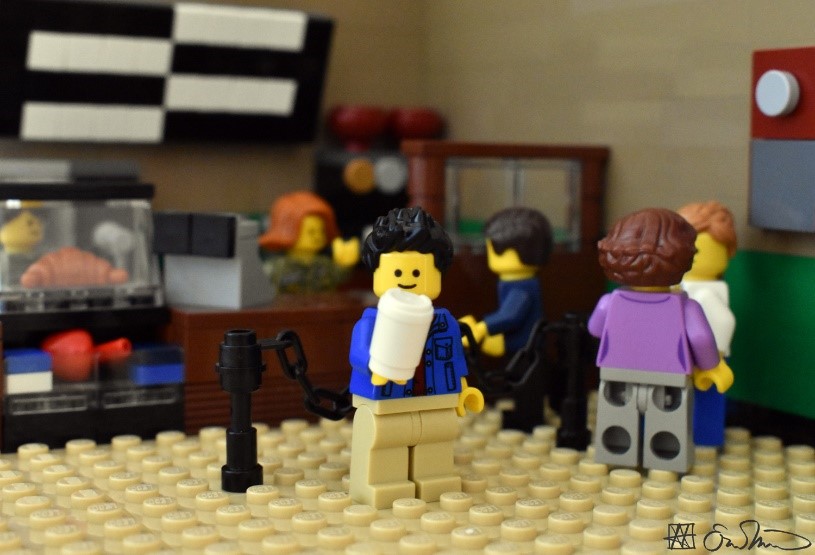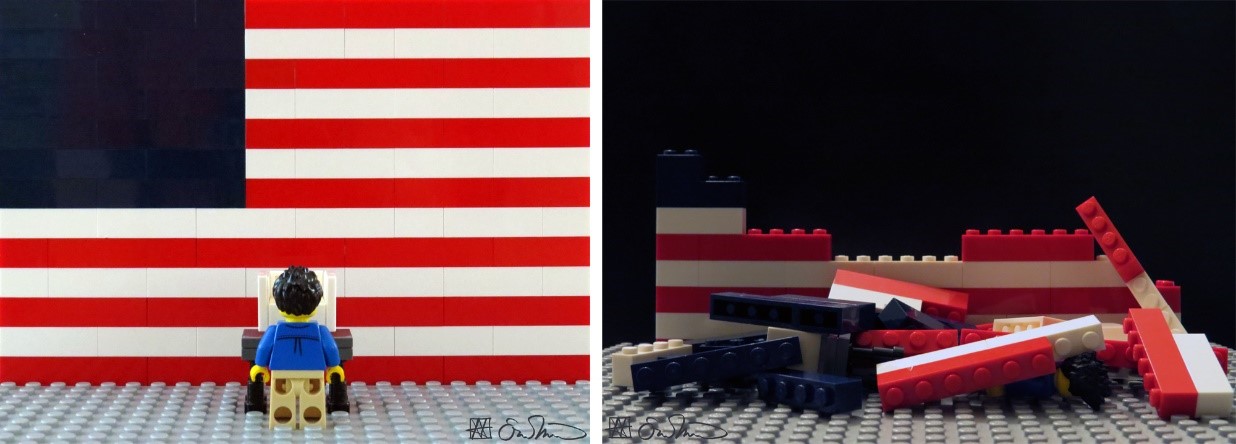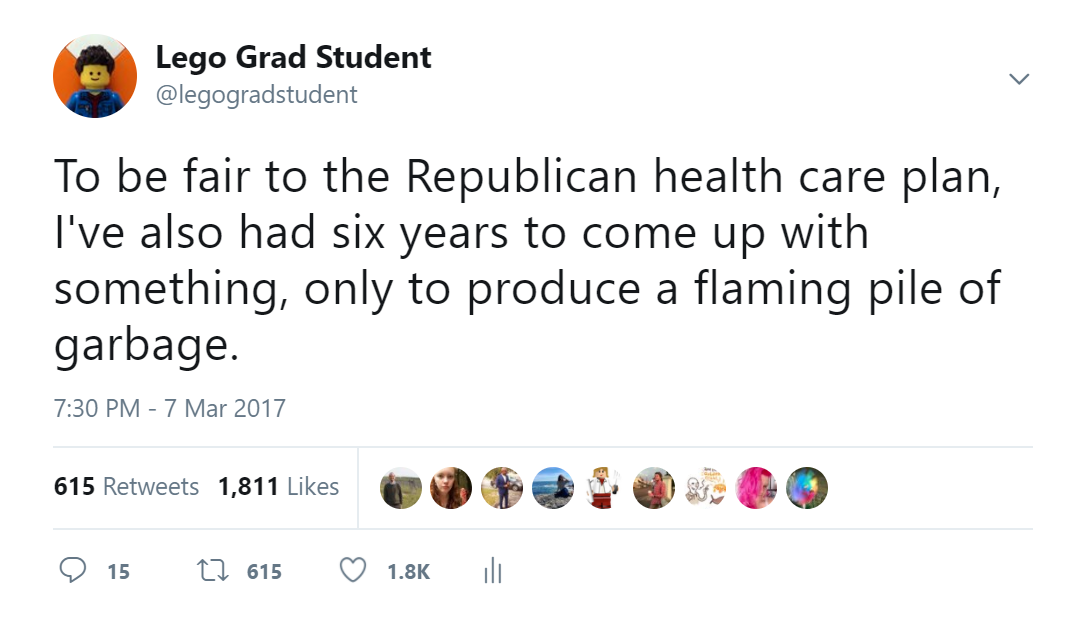Reflections of an Unintentional and Underqualified Social Media Micro-influencer Lego Grad Student / Somewhere on the West Coast

This “article” is an indirect result of a dark personal joke. [1]
In the summer after my fifth year in a Ph.D. program, my dissertation work had hollowed out my soul. I sought a distraction from my feelings of despondence, only to realize an even harsher truth: I no longer had any hobbies, and I had lost my past sense of creativity. Not only was I failing at academia, but also at being a complete human being.
Feeling moderately hopeless, I took refuge in my childhood. I drove to a local LEGO Store and purchased a large $160 set that would have sent a younger me into some form of shock. (I had spent my entire childhood leveraging birthdays and holidays to slowly accumulate a five-gallon tub of LEGO pieces. The day I was forced to give my collection to some cousins was one of the sadder moments of my life.) Building the LEGO set gave me a childlike sense of joy and freedom I had not felt in months—if not years. [2]
Dissatisfied with how quickly I built everything, I promptly tore apart the 2,300-piece set, as well as another 2,500-piece set I had purchased several years ago. With almost 5,000 pieces on hand and inspired by bathroom humor, I built a small scene of a mini-figure draped over a toilet. I wanted to keep building, so I decided to come up with a short story for why this nameless mini-figure ended up in this dire condition. The story was simple and uncomfortably familiar: A grad student is having trouble with his research, meets his advisor, and is crushed by his response (which led back to the first build). I constructed and took pictures of four additional scenes, each of which came with a dark and existential caption. [3]

I found a strange sense of joy in seeing this collision of my childhood innocence and my adulthood cynicism. I posted these images and captions on my own Facebook page. My friends, many of them graduate students, suggested that I post them publicly. I subsequently opened several social media pages using the name “Lego Grad Student” (LGS), but harbored no expectations that anyone would see them.
Through an extraordinary stroke of luck, this personal joke called LGS now has almost 100,000 followers across all social media platforms, and I have been invited to write something for this special issue of Flow. I remain bewildered and grateful by this turn of events. People much more adept at social media say this makes me a “micro-influencer.” This term, as well as “brand,” were unsettlingly corporate words that highlighted how unfamiliar I was with social media. [4] I only used Facebook in my personal life, and I had never attempted to promote myself online.
As such, the last 16 months have been a jarring crash course in learning how I want to live in this completely unfamiliar realm. I will now pretend that I am thoughtful enough to reflect on these experiences. Apologies in advance to anyone, but particularly art and media studies students, that may find my discussion to be shockingly primitive.
A Change in Possession
LGS began as a private distraction and a semi-subconscious effort to wrestle with internal strife. Even so, it was clear that many people strongly related with the existential angst I captured in my posts, and that I was providing a source of solace to many academics that felt alone in their suffering. The comments and messages I read to this effect have been one of the most rewarding surprises of LGS.
At the same time, I have struggled with how to process this unexpected inflow of followers. My posts were no longer exclusively mine, but part of a collective experience. Because the posts were relatable on an emotional level, many people also seemed to feel a unique sense of ownership or connection with LGS. I was not prepared for this shift, and I initially felt new pressures to keep making new posts in order to appease the audience. I realize this may sound self-important, but it indicates my level of utter confusion when momentum began to build. It also attests to my own fears about striking a balance between my already busy academic life and a side project that was quickly threatening to get out of hand.
I ultimately made a very conscious choice to keep treating LGS as a personal hobby—something I am doing for myself that incidentally happens to provide solace to others. This seemingly ungracious philosophy is my attempt to prevent unforeseen social media success from undermining the original point and appeal of LGS: to unwind and to document/process my own turmoil. The more people that follow, the more I try to ground myself in this philosophy. It does not always work, but this mindset is what keeps LGS from becoming an obligation, which is the quickest way to kill it.
A Change in Consistency
My first post had this caption: “Suffering from writer’s block, the grad student stares at a screen as empty as his hopes and dreams.” As I built more scenes, I decided to tie everything together by sticking to the same structure as the first caption: “[Present participle] ____, the grad student ____.” I essentially thought of LGS as an actively growing photo exhibition that featured a consistent running series of images and words documenting the injustices of grad student life. This worked well enough, and followers seemed content with this scheme. But looking back, this was a very strict, unidirectional, and inexperienced approach that did not fully recognize social media’s flexibility.

Things forcibly changed after the 2016 presidential election. LGS was no longer fun to create and felt even more trivial than ever before. After some time passed (including a period where I considered ending LGS), I returned to it as a conduit to help me process my turmoil—except now, that turmoil was political. Even so, I wanted to stay within some broad confines that kept the page’s general tone. I decided that if I wanted to post something involving politics, it needed to either feature a LEGO build or have some tenuous academic angle. That is, if it was not LGS, then it needed to have at least the “L” or the “GS.” This rationale sounds far more thoughtful than what I felt back then. In the moment, I was blindingly upset and did not care whether any change in LGS’s so-called “brand” would kill the page or not. I suppose my creative sensibilities just refused to stay silent, even in the midst of a crisis.


The fact that it helped to gain followers is a testament to how poorly I understand social media. My political posts appeared to provide a sense of solace and togetherness that was similar to my typical LGS posts. But more importantly, I think I have realized that many see my personality, expressed through my posts and my responses to comments, as the real core of LGS. [5] That provides a great deal of latitude in how I (ab)use my social media presence beyond the typical images and [present participle] captions that I continue to post. Of course, I could be wrong and one day do or say something that alienates all my followers. It does not take an expert to know that social media is a fickle beast.
A Change in Identity
LGS started anonymously as an act of self-preservation: I was going on the academic job market and feared that a humorless search committee member would discount my ability to engage in a professional career. I also saw no reason to voluntarily disclose my identity.
It took time for me to discover that this decision to remain anonymous would actually become a quiet but essential part of LGS. As I gained followers from a spectrum of fields, I sensed that my anonymity also enhanced my relatability. [6] People were able to insert themselves into my posts much more easily when they could not think, “Well, LGS studies [discipline] at [location], so this is not really about me.” I feel considerable joy (mixed with a twinge of sadness) from seeing people across so many fields react similarly to my content.
My anonymity also seems to invite followers to create their own image of who I am. It is not impossible to figure out my identity based on what I have publicly posted, but relatively few people have asked me about it. Most followers appear not to care or perhaps prefer not to know. I do not blame them. In fact, I almost appreciate the gesture. I can categorically say that I am not as interesting in real life as I may seem online. That is not to say that I adopt a fake persona online, but rather that people only see an incomplete version of me and tend to be generous when they try to fill in the blanks. It is mystifying when I respond to comments, only to see the original commenter get excited that LGS spoke to them. I know myself, and I do not merit that level of enthusiasm. That said, I have gradually done things that have exposed more of my identity (including a guest appearance on a podcast), so perhaps I should not lean on this point too strongly.
In conclusion, this “article” boils down to five thoughts.
- I am unsure how I got here.
- I do not know how social media works, much less what it means to be a micro-influencer.
- Almost every seemingly good choice I have made regarding LGS has been inadvertent.
- My only plausible qualifications to write for this special issue were owning a decent LEGO collection, trying to stay true to myself, and being swept up by the random whims of the internet.
- Sorry.
Image Credits:
All images are the author’s own work.
Please feel free to comment.
- I would put the word “article” in ten sets of quotation marks if it were typographically acceptable. [↩]
- Note that LEGO® is a trademark of the LEGO Group of companies which does not sponsor, authorize or endorse this written piece, my posts, or my social media accounts. [↩]
- I took these pictures using a glorified digital camera that I had previously purchased through a research grant. There is some poetic irony that. [↩]
- Given what little influence I felt I had with my dissertation committee, maybe “micro-influencer” is not a completely inaccurate term. [↩]
- That said, I chose to keep Instagram and Tumblr free of politics for a couple reasons. First, I wanted to leave a space where people could choose to only look at the LGS posts without thinking about politics. Second, I found Instagram and Tumblr to be terrible for social interaction. [↩]
- This stands in contrast with academia, where anonymity in the review process enhances vitriol and bitterly destructive comments. [↩]
Thank you for LGS and for this article. Reading LGS has given me an insight into what my daughter is going through as she pursues her PhD in Human Genetics.
LGS, you keep doing you. Things start to suck when creators put all effort in Maximum Appeal (TM), or worse, hire a marketing strategist. Grad school is about these (almost) universal experiences and getting to the point where people what you do regardless of Maximum Appeal (TM) or marketing. I have friends in many departments and sometimes it is hard to be on the same page, but we can always browse LGS together and find our common ground again.
Lego is a useful thing for students who are graduates even! A lego develops all people! I think that grad students need help from the http://www.uk.papersowl.com that proposes do assignments for students without their help!